|
Getting your Trinity Audio player ready...
|
Wolfgang Amadeus Mozart’s The Marriage of Figaro isn’t the easiest story to follow, you know, given the plot’s many twists and turns.
For a Ghanaian audience, interest in that masterpiece would be even lower. Operas are not exactly popular in these parts, and most would struggle to get through the first act of The Marriage of Figaro. But if any do manage to drag themselves into the second act, at some point, their ears are sure to perk up.
That’s the point when Cherubino (traditionally played by a woman with a soprano voice), the page pining for the Countess’ love, belts out ‘Voi Che Sapete Che Cosa E Amor.’ The familiarity, though, isn’t because the Ghanaian listener has any great comprehension of Latin, the language in which the song is sung.
More likely, it is because they’ve heard that tune before, time and again. Indeed, for the best part of the last three decades, ‘Voi Che Sapete’ has been a feature on Ghanaian television, as the signature tune for the National Science and Maths Quiz (NSMQ).
A bit like classical music and its accompanying storylines, the NSMQ ordinarily isn’t everyone’s cup of tea.
Those with an appetite for equations and formulae — with jaws strong enough to crunch digits and the stomach to digest them — would certainly have found the NSMQ’s content engaging. You probably would have been hooked, too, for an episode that featured the second-cycle institution you attended.
For the vast majority, though, there were many more fun ways to spend that mid-morning period on Saturdays during which the pre-recorded contests were aired on TV.
The NSMQ’s profile, these days, is much bigger. Forget the Vodafone Ghana Music Awards (VGMA); the NSMQ is now, arguably, the country’s biggest, most-anticipated annual event.
The 2021 edition, which climaxed on November 26, was widely followed, with millions across Ghana’s length and breadth tuning in for the grand finale; wherever there was a screen — be it at home, or at a pub — there were eyes keenly feasting on the just-as-keen battle of brains and wits.
That, very much, has been the tale of the last few years.
Yet this elevation of the NSMQ, from barely registering on the national ‘interest-o-metre’ to becoming a must-watch, has been no sudden leap. It’s a story of persistence and perseverance, of highs and lows, of frustration and triumph.
And who better to tell it than the man who conceived the very idea 28 years ago, and the woman who currently runs the show?
LIKE FATHER, LIKE DAUGHTER

Three is a crowd, they say, but there is certainly nothing crowded about the office space — at the Ashaley Botwe address of Primetime House, home of Primetime Limited, producers of the NSMQ — that I occupy on this late-afternoon with Dr. Kwaku Mensa-Bonsu and the eldest of his three daughters, Nana Akua Ankomah-Asare.
There is more that binds father and daughter than just blood ties, though.
Affixed unto the hat Dr. Mensa-Bonsu wears is a pin that speaks of his association with the Lions Club International, the world-famous non-political service organisation.
The office, Mrs. Ankomah-Asare’s personal working space, also bears witness — including a plaque proudly on display — to her own association with said club. Their outfits for the day, too, are cut from the same type of cloth, wax prints featuring the efie mmosea design.
Even so, there is nothing quite as mutual as how both feel about the NSMQ, the brain-child of Dr. Mensa-Bonsu that has now been passed down into the able hands of Mrs. Ankomah-Asare.
The latter is forty-ish, the former obviously older, but the vigour with which both talk about the NSMQ makes one feel as though the sum of their ages isn’t nearly as high as what it actually is.
Mrs. Ankomah-Asare knows as much about the NSMQ as her father, I’d find out later, but she politely defers to him when I ask about the programme’s beginnings.
“OBSERVE INTENTLY THE BIRDS…”
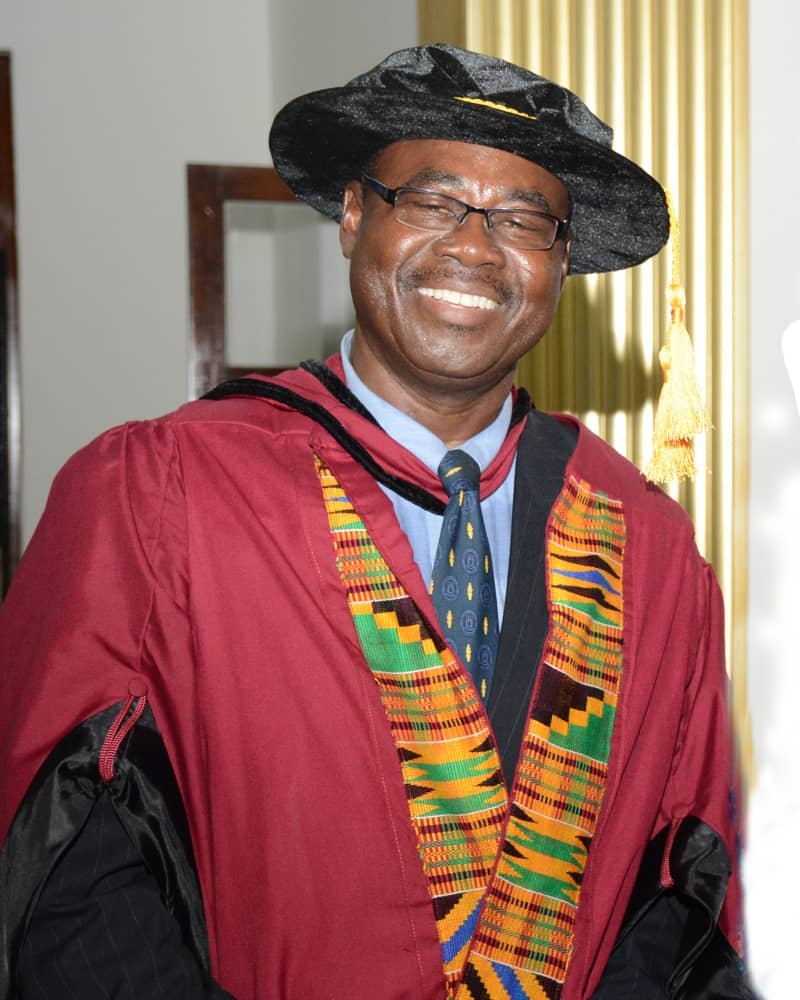
“Prempeh College, in this year’s final, picked up full points for a question about why birds could perch on live electric wires without getting electrocuted, while humans aren’t so fortunate when we come into direct contact with same,” Dr. Mensa-Bonsu begins.
“Within that answer lies the nucleus of what would become the NSMQ.”
Dr. Mensa-Bonsu tells the story of how, on one Saturday morning in April 1993 when he turned up at the Legon tennis court, he observed the birds — pigeons, specifically — benefiting, as they always have, from the phenomenon Prempeh correctly explained.
“Without a background in the sciences,” he says, “I had to inquire from Prof. Ebenezer Kweku Awotwi, a playmate in whose company I was that day at the court. An expert in Animal Science, the good doctor had little difficulty in providing a satisfying answer.”
Well, that certainly sent Dr. Mensa-Bonsu’s creative mind into overdrive, but the wheels were already in motion for a competition intended to demystify science and make the subject appealing to curious minds, be they old or young.
“Just days earlier, I had submitted a proposal for the would-be NSMQ to Mr. Martin Eson-Benjamin, Marketing Director at Lever Brothers (later Unilever Ghana Limited), seeking sponsorship.
“I opened up about those plans to my good friend, Prof. Awotwi, also taking the opportunity to invite him on board, should my proposal receive positive feedback later that week.”
It did, and Primetime prepared for the competition’s take-off, with the next item on the to-do list being the choice of a quiz moderator. Eventually, one was found.
“That choice, the late Prof. Marian Ewurama Addy, was just what the programme needed, as we also sought to encourage young girls to take up the study of the sciences and strive to excel. As one of the country’s eminent female academics, she was a perfect fit.”
Thus began Prof. Addy’s long and successful run as the NSMQ’s public face, the first in a line of brilliant quiz-mistresses that continued with Dr. Eureka Emefa Adomako, Prof. Elsie Effah Kaufmann, Mrs. Gladys Odey Schwinger, Dr. Thelma Ohene-Agyei and Dr. Anita Oppong (the last three currently serving as supporting quiz-mistresses for Prof. Kaufmann).
GROWING PAINS
In September 1993, the maiden edition of the 32-school Brillant Science and Maths Quiz (as the competition was originally named, a nod to the bright blue Brillant brand of soap produced by Unilever) was launched, with Prempeh — kings of the northern zone — winning the first of their five titles in a memorable final against Achimota School, champions of the south. By January of the following year, the programme was on the screens, airing on Ghana Television (GTV) in its familiar weekend slot.
For four years, the show rolled on with little incident. But then came 1998, when the programme hit its first major snag, following a change in leadership at Unilever.
“I was summoned for a meeting with the new Marketing Director-cum-Vice Chairman of Unilever, a Scotsman, who informed me that he intended to run things a little differently from his predecessor, opting to focus instead on the company’s core business and shedding secondary responsibilities. That new direction meant cutting ties with the programme.”
The decision — kicking into immediate effect — couldn’t have come at a worse time, really. The next edition of the competition was just days away from commencing in Accra, with the contestants already arriving.
“Suddenly, we were left with a programme to run, a big budget, but woefully short on cash. Where to go?”
There really weren’t many places the producers could turn to in their bid to salvage the show, but the one door Primetime knocked on did open just wide enough.
The Ghana Education Service (GES) agreed to absorb the cost of feeding and accommodation but, even so, there remained a significant chunk of expenditure that Dr. Mensa-Bonsu and his team had to foot themselves.
Going forward, a more sustainable source of financial support was required, and Dr. Mensa-Bonsu was fortunate enough to be able to call on an old friend.
“Mr. Eson-Benjamin had moved from Unilever, and was now back with the company he had formerly worked for, as Managing Director of the Kumasi Brewery.

“I sought his assistance once again to keep that year’s edition — which had already started, anyway — running. Thankfully, following consultation with the company’s Board, a timely decision was made to extend the needed support.”
And so the quiz – now rebranded as the National Science and Maths Quiz (NSMQ) – continued to survive and to thrive, kept afloat by the Brewery’s Amstel Malta beverage brand. But even that lifeline wouldn’t last very long, lost in 2001 for reasons similar to those which led to the loss of Unilever’s backing a few years prior.
Reliance on Corporate Ghana had failed not once but twice, and in the search for a new sponsor, the assistance of the Ministry of Education was sought, eventually granted through the Ghana Education Trust Fund (GETFund).
By 2009, however, that plug had also been pulled. Unable to keep the programme going solely on the company’s own limited financial strength – having managed, admirably, to do so in 2009 – Primetime was forced to put the NSMQ on hold for two years.
“Those years, though tough, weren’t at all idle,” Dr. Mensa-Bonsu says. “Behind the scenes, efforts were being made towards the show’s revival, and the Conference of Heads of Assisted Secondary Schools (CHASS) had a lot to do with it.
“The President of CHASS at the time, Mr. Samuel Ofori-Adjei, then headmaster of Accra Academy, was a colleague with whom I sat on the Council of the University of Ghana. A huge fan of the NSMQ, he wasn’t too pleased that the Ministry of Education had cancelled the GETFund sponsorship, and advised us to petition the Ghana Education Service (GES) Council.”
That proposal was for students in all public Senior High Schools to be levied a small fee per term, with those funds channeled into the NSMQ. The Council sanctioned that arrangement, with Mr. Ofori-Adjei proving instrumental in lobbying and pushing the petition through, paving the way for the NSMQ’s rebirth in 2012.
FROM STRENGTH TO STRENGTH

What doesn’t kill you — as the well-worn cliché goes — makes you stronger, and that has certainly proven true of the NSMQ. Following its comeback, the competition has gone from strength to strength, blossoming into the massive event it has now become.
“With so many schools now contributing to the kitty that guaranteed the NSMQ’s sustenance, the competition had to expand in size, from the set of 40 schools (up from the original 32) that existed at that point in time.”
That remark comes from, not Dr Mensa-Bonsu, but his daughter, Mrs. Ankomah-Asare, who virtually takes over from this point in our interview — unsurprisingly, given how involved she has been in the show’s production over the period that our conversation now covers.
“On the NSMQ’s return, we maintained the 40-school format, but things switched up from 2013 onwards,” she explains.
“We wanted to carry out the expansion gradually, to make the change easier to handle and be able to fit it all into our allocated TV air-time for the year. And so we went up to 81 schools (of which 66 made an appearance) in 2013, then to 135 – the number at which we are currently pegged – in 2014.”
It isn’t only in terms of size that the NSMQ has grown, however; it’s also in profile and in popularity. Mrs. Ankomah-Asare has an idea about just what might have contributed to that.
“Harnessing the power of social media and technology has played a key role in propelling us to these heights,” she says, though admitting that there was an initial wariness about treading that path.
“A member of our team suggested, in 2013, that we set up social media accounts for the programme to help boost public interest. While the idea seemed exciting enough, the bit that involved live-streaming the show presented peculiar challenges that needed to be sorted out before a definite decision could be made.
“For one, the pre-recorded nature of the NSMQ broadcasts had always allowed us to iron out any ‘flaws’ during the production process, with the final product served on television being almost picture-perfect, a luxury that switching to live broadcasts would rob us of.”
Another question required answering, if the NSMQ was to go live and do so with success: was the show to be kept as the TV programme it had always been, or was there more to be gained by branding and selling it as something bigger — i.e., an event?
“There was a fine line to be walked in ensuring that the educational intent of the show wasn’t sacrificed on the altar of entertainment value, while simultaneously making it appealing enough to those whose interest in the NSMQ was tied to the show’s lighter side.”
In the end, a solution to maintain that balance was found, one that allowed the NSMQ to flourish in all those ways without losing its focus.

“Taking that route was a no-brainer, really, if we could manage the shift properly. The NSMQ is a youth-oriented programme, and now we could reach out to that primary audience on those platforms — Facebook, Twitter, etc. — where young people congregate for hours all-day.”
With that in mind, the social media accounts were created, and a youthful team formed and assigned to manage them. It didn’t take too long for the rewards of that move, and the lessons it taught, to become abundantly clear, as Mrs. Ankomah-Asare goes on to narrate in an anecdote.
“In 2014, Mfantsipim School won the NSMQ but, due to scheduling issues, that edition was still showing on television while production of the 2015 edition, won by Prempeh, was well underway.
“The increased publicity, thanks to social media, drove hundreds to the venue to watch the contests live, with the 2015 winners being celebrated publicly long before most people were even aware of how the preceding edition had concluded.
“In any case, hardly anyone cared about the ongoing TV broadcasts of the previous year’s competition; it was very much about the present and, in a sense, the NSMQ’s followership was ahead of the organisers themselves. We couldn’t afford to stay behind. We had to catch up and move with the times.”
And move they did.
“In 2016, we explored social media more fully, hosting our first live-stream. Operating on a strict budget meant we could only cover the opening ceremony and the contest from the quarter-finals onwards. Today, I’m glad to say we have enough resources to be able to stream the Preliminary and One-eighth stages live as well. That’s really something to be proud of.”
The resonance of the NSMQ’s modern vibe was recognised on 4th December, 2021 with six Gold Awards — in the entertainment categories of Branded PR, Digital, Social Media, Print, Integrated Campaign, and Television — at the 15th AAG Gong Gong Awards.
Chapeau!
A GROWING CHORUS
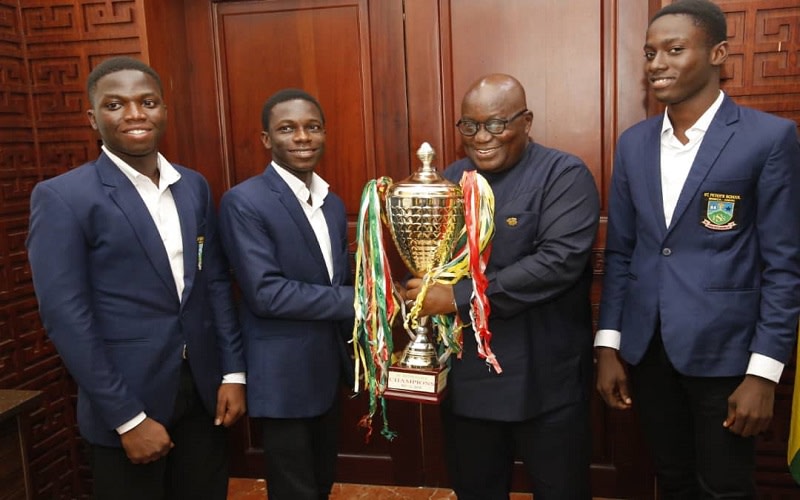
Speaking of resources, its scarcity in the NSMQ’s history is well-documented. But the story couldn’t be more different these days, as reflected by the sheer number of sponsors and partners that have jumped on the bandwagon and the prizes on offer each step of the way.
“At Primetime, our goal isn’t to fleece the programme for our own gain, and that’s why we funnel much of the funds we receive into rewarding the participating schools and their students. That has made the NSMQ more competitive and exciting; losing doesn’t feel as bad as before, and winning feels so much better now.
“But it isn’t like Primetime itself is rolling in the stuff, although we would appreciate that, going forward, sponsors would contribute a little more to funding the production itself. It would also be nice to see the benefits of the lucrative ‘Money-zone’ trickle down to even the Preliminary Stage, just so there would be enough cash to go around.”
Yet even as Primetime seeks to widen the NSMQ’s pool of sponsors and funding, it’s already remarkable just how a programme that once struggled for support is now such an attractive prospect for major industry players in the Ghanaian corporate realm.
Just how has this been accomplished?
“Success has many parents,” Dr. Mensa-Bonsu comes in again. “In those difficult early years, the ‘education is not our business’ line was thrown at us so very often. The chorus is, obviously, very different now.”
But, of course, a chorus is usually only as melodious as the tune behind it, and Primetime has provided just that.
In a world increasingly reliant on science and technology, the NSMQ’s relevance is greater than ever, as it addresses an area of real significance to life in the 21st Century. It also helps that the NSMQ is now packaged as an alluring blend of education and entertainment — edutainment, they call it — which makes it just the sort of thing that could make companies dip deep into their coffers.
“Allowing the NSMQ to become the event that it now is — complete with jama sessions and even band-performed anthems of all three finalists — has gone a long way to entice many, from fans to sponsors,” Mrs. Ankomah-Asare adds.
THE NEW NORMAL
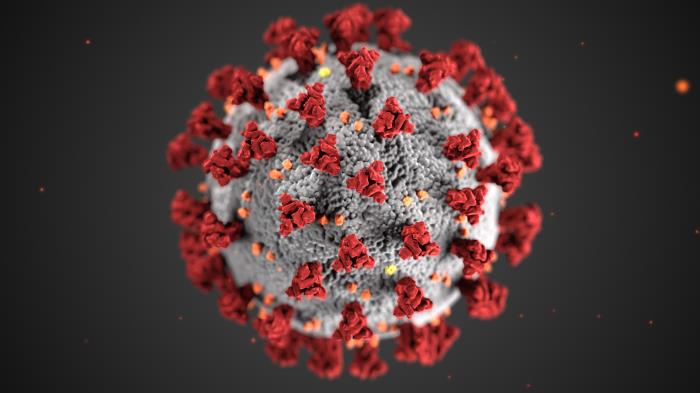
In 2020, the NSMQ faced what Mrs. Ankomah-Asare describes as “an existential question.”
There were doubts about whether the competition would take place, just not for the reasons that had hitherto threatened and — even briefly — ‘killed’ the programme.
The threat, this time, was one that everyone — and every event — around the world had to grapple with: the raging COVID-19 pandemic.
“To start with, there was a question about whether the NSMQ, such a hive of activity, would come off at all. And once we figured that out, we had to come up with a plan to ensure that the show was organised in conditions that were as safe as possible for all.”
That meant drawing up a comprehensive checklist, painstakingly doing whatever it took to tick each box. As NSMQ editions came, this one was going to be stripped-back, and considerably so.
“We informed the schools that they had to keep their contingents smaller than usual and not bring along any supporters while, on our part, we had to tone down on publicity so as not to attract any crowds to the venues. Also, to compensate for the lack of live audiences, we had to stream all 80 contests – double the number of our live-streams in previous years and thus a major adjustment to make to our budget and logistics for the programme’s technical production.”
But there was more.
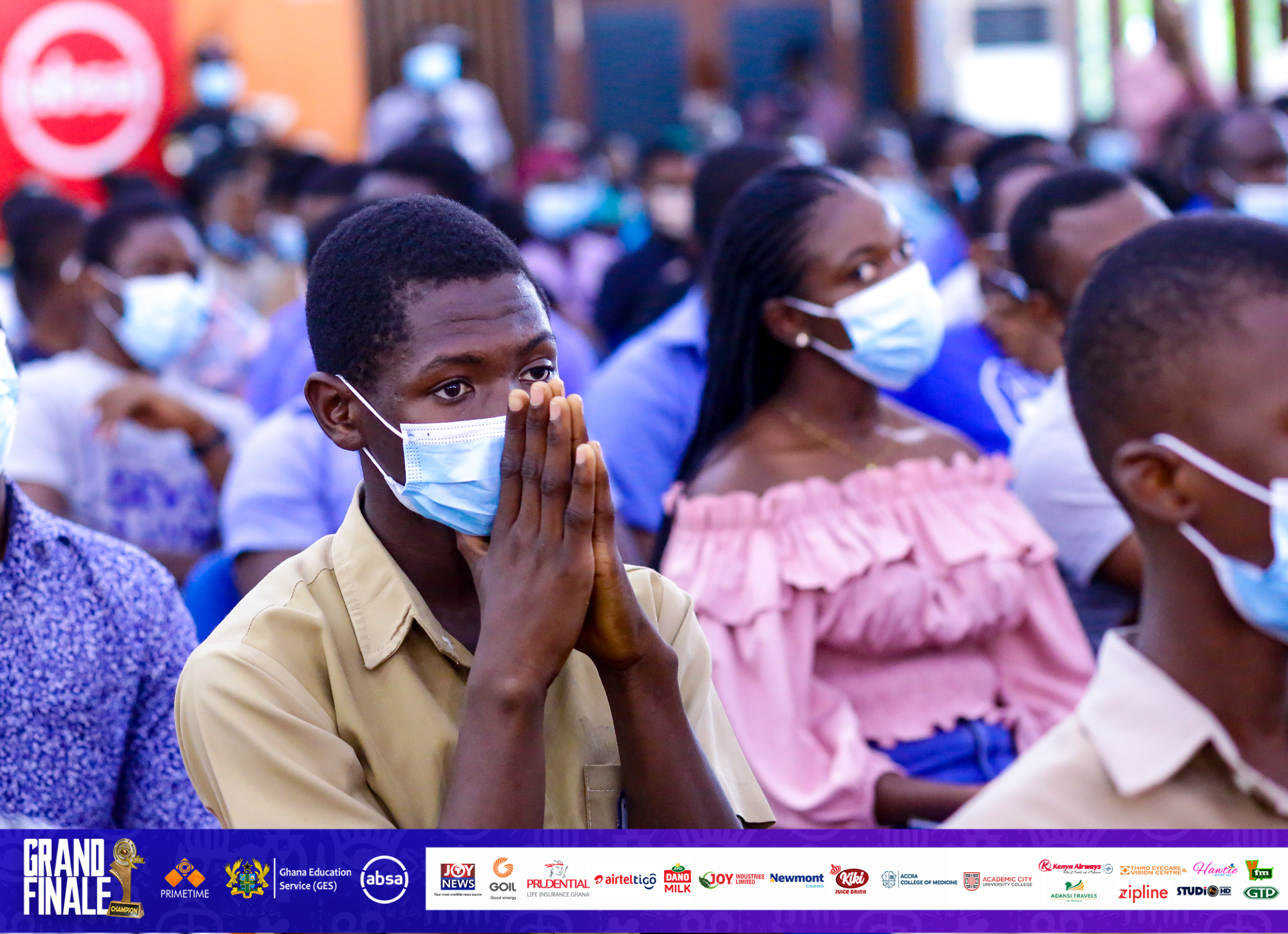
“Usually, all 135 participating schools have to come to Accra for the NSMQ’s entire duration. Due to the prevailing circumstances, however, we had to travel instead to the various regions for the Preliminary Stage.
“By the time the Finals in Accra were due, COVID-19 was even more of a threat to the country than before, and so we had to shore up our defences. We made sure everyone present was properly tested, that the air in the halls was purified, that the contestants’ workspaces were disinfected after each contest, and that the various contingents were provided with enough N95 masks and Vitamin C tablets, all while observing the regular COVID-19 protocols.”
It was also deemed necessary to keep those who were particularly vulnerable to the ravages of the pandemic, especially the older members of the NSMQ crew, away from the action. And what had been, for years, only an emergency medical team, had to be upgraded into an on-site, 24-hour clinic.
All of that came at considerable cost but, with health being of paramount importance, it was worth it. Besides, COVID-19, terrible as it is, brought with it some positives.
“We learned to trust science and to utilise technology even more — and why not, given what the show is all about? — as, with fewer people generally present, we upped the ante of our social media engagement and also conducted the NSMQ Review Show via Zoom.”
The experience from 2020 made the 2021 event a little easier to manage and a lot more like the NSMQ in normal times — as normal, that is, as ‘the new normal’ permits.
HITTING THE ROAD

For its first 25 editions, the NSMQ was hosted in Accra. This year, Primetime decided to move the whole party to Kumasi, a city that has a rich history in the competition.
Three of the first four editions were won by a Kumasi-based school, and the city made good on its host-and-win promise, courtesy of Prempeh.
Primetime pulled it off remarkably well, but it did take a great deal of work — much of it challenging, needless to say — to do so.
“We had mulled over the idea for a while, going to Kumasi to do reconnaissance work and explore the possibility as far back as 2017. We undertook a similar exercise in 2019, but it was this year that the various factors aligned perfectly enough for us to actually make it happen.”
Moving wasn’t too difficult, or certainly not as daunting as it might have been a year prior. Being able to carry the NSMQ around the country for the Preliminary Stage in 2020 — thanks to COVID-19 — had prepared them for this, and the organisers passed the test with flying colours. They did have a good time, too, leaving with fond memories.
“Kumasi — from the Asantehene, whom we had the privilege of meeting twice, to the ordinary folk who cheered and waved excitedly as Prempeh’s triumphant procession moved through the city’s principal streets to the College’s campus — received us warmly, and the individual quizzes themselves were well-contested and well-attended,” Mrs. Ankomah-Asare says, flashing a smile that reveals a fine set of teeth and great contentment.
In her opinion, and certainly in those of many, one particular contest stood out: that all-Kumasi semi-final.
“The atmosphere at the grounds when arch-rivals Prempeh and Opoku Ware School clashed with ‘hosts’ KNUST SHS was one of the best I’ve ever seen in the competition’s history. The numbers that turned up were what one might expect for a typical Final in Accra; it was, in more ways than one, the Final before the Final.”
“I had travelled to Accra a week prior to that contest, in the hope that I would return to Kumasi in time for its commencement. I did make it to Kumasi, even to the venue itself — the main campus of the Kwame Nkrumah University of Science and Technology (KNUST) — just in time; only that I couldn’t get as far as the auditorium, such was the magnitude and density of the crowd that had filled the premises.”
Like most of us, Mrs. Ankomah-Asare, beating a hasty retreat to her hotel room, had to enjoy that thrilling episode via the live-stream. The overall experience was fulfilling, though, the change of environment refreshing, and she hints that this might not be the last time the NSMQ hits the road.
For now, though, it’s time to put those tired feet up and bask in the glow of another successful Primetime production, surely?
“Not really,” she replies. “The cycle for next year’s competition is already starting. Hopefully, we can raise the bar even higher.”
LOOKING BACK, LOOKING AHEAD
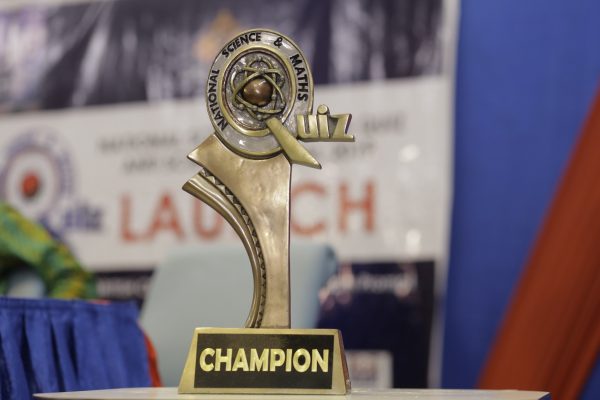
“I’m a proud man,” Dr. Mensa-Bonsu beams, his brown hat still firmly in place.
“Proud of how far the show has come, yes, but also proud of how far my daughter has brought it. I can only imagine how much bigger and better the NSMQ could become in, say, the next five years.”
That would be in 2026, when the NSMQ would have been in its 31st year of active existence. By the time the show turns 30, though, it could be breaking new ground — well, not exactly new.
“We would like to relaunch an international version of the NSMQ,” Mrs. Ankomah-Asare says, “featuring schools across the continent. It was actually planned to happen last year, but for COVID-19 and the restriction of movement across international borders it has brought about.”
Relaunch, yes, because this has actually happened before, albeit on a smaller scale. For those old enough to recall, that antecedent came in 2007, when the West African Science and Maths Quiz (for Anglophone West Africa), contested by three (3) teams each from Ghana and Nigeria, was held in Accra.
The NSMQ has, already, broadened its scope in other ways. Earlier this year, a first-ever STEM Festival, comprising the Mentorship Sessions and the Sci-Tech Fair, was organised. Those had been part of the NSMQ itself, but now they make up a separate event, aimed at highlighting the many practical ways in which scientific theories could be applied to daily living.
![Sci-Tech Fair 2021: Producers of NSMQ call for Entries [Check How To Apply] - Unitedshowbiz.com.gh](https://nsmq.com.gh/wp-content/uploads/2021/03/NSMQ-SciTech--scaled.jpg)
“That has always been among the objectives of the NSMQ, along with promoting healthy academic rivalry between schools, and generally encouraging the study of science among young people,” Dr. Mensa-Bonsu tells me.
“I’m glad to say those objectives have been met to a satisfactory extent, thanks in no small part to the long list of collaborators, consultants, sponsors and partners we’ve had over the years. In fact, heads of quite a few schools have intimated that they were inspired to start offering the General Science programme by the NSMQ.”
“Even the common man,” picking up on another of the questions asked during this year’s finale, “has learnt something new from the NSMQ: remember why palm oil is red?
“I believe we’ve started a revolution here.”
Well, then.
Long live the revolution.
Yaw Frimpong — Daily Mail GH





